From a barn to a chapel
The story of a Ryde family who converted a small barn into a family chapel.
When the CBCEW designated 2020 as the Year of the Word of God, I don’t think any of us ever imagined how prophetic that would be. It is, now, all we are left with during this unprecedented time in which we are unable to attend Mass or receive the sacraments. Even now, as Lent has ended, we must continue our prolonged spiritual fast until the threat of Coronavirus has ended.
Many people are naturally very upset because their normal routines have been disrupted. While this is completely understandable, St Teresa of Avila warns us about getting too stuck in a particular routine or spiritual practice. The danger is that we become passive, and the comfort of the routine becomes more important to us than the spiritual practice itself. So in effect, the routine itself becomes a false idol.
I think it’s a huge blessing, however painful, that we have had our routines disrupted. It is easy to fall into taking these wonderful and amazing things for granted. I hope that when we return to normal, we will all have a greater appreciation for the Eucharist, and the Mass. The longing that we feel is a good thing. It gives great glory to God.
The second huge blessing during this time is the vast amounts of home altars and prayer tables that I have seen online, made by Catholics all over the World. These home altars have become focal points, and have truly brought the faith back into people’s homes in a visible way. It is so wonderful to see statues, Bibles, rosaries, icons, candles and holy pictures adorning people’s coffee tables and windowsills. I have seen families who have printed out and stuck the Stations of the Cross all the way up their staircase, where the whole family can climb the way of the cross alongside Jesus. Others have made rosary walks in their gardens. People’s creativity, inspired by a deep desire to be close to God has been something I have found to be very beautiful and moving. And I think it is safe to say that without this period of lockdown, these things might not have happened within our domestic churches.
Many have found viewing Mass online to be very good. I understand that a lot of lapsed Catholics are tuning in and rediscovering their faith for the first time in years. One particular person told me that seeing the Mass online invoked an emotional and treasured memory of saying bedtime prayers with mother during childhood – over 50 years ago. It moved their heart.
For us online Mass didn’t work because it was too passive. Our children associate screens with leisure time and entertainment – and that is not what the Mass is about. They very quickly got bored and disengaged. Instead, we decided to try doing the liturgy ourselves. This worked a lot better. The older children did the readings, and my husband or I would read the Gospel and give a very short homily. Of course, we do not have the Eucharist, or a priest, but we read the main parts of the Eucharist prayers together, and made a spiritual communion.
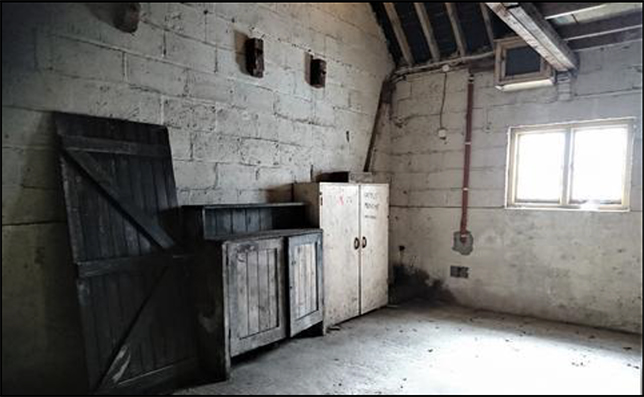
By the second week I realised that we needed a better prayer space. So, I decided that we would transform our old barn into a chapel. We found some tins of paint in our garage, and an old rug that was perfect to create a sanctuary space. An old chest of drawers became the altar, and I borrowed some candlesticks from my Mother in law when I went to drop off her shopping. Fortunately, I make vestments for a living, and so was able to use my treasure trove of liturgical fabric offcuts to create two altar frontals, but a nice tablecloth would have worked just as well. I printed out some pictures and made a Carmelite icon wall. The red theme of the chapel reminds me of the blood of the English martyrs, and Catholics at the time of the reformation. Although circumstances were different, they too were deprived access to the sacraments, and had to create their own prayer spaces within their own homes.
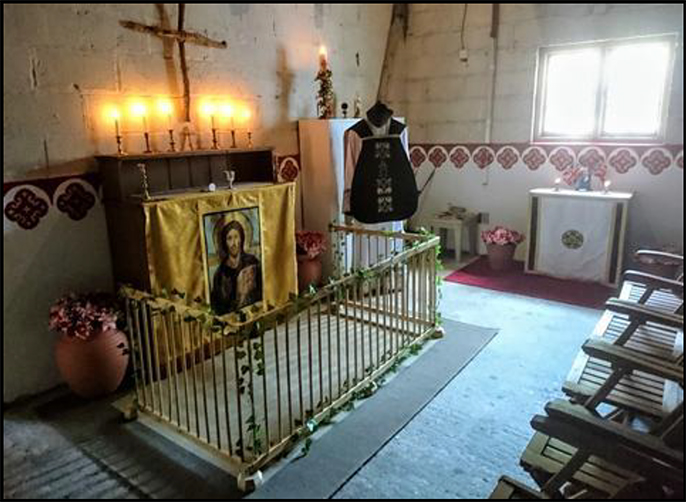
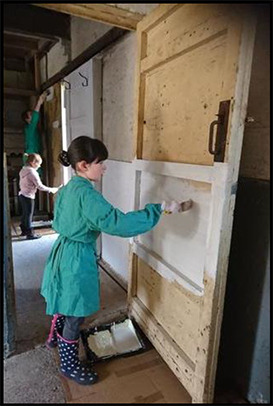
For our children and us, the outward active participation of creating this space fostered the more important inward active participation during our improvised liturgy. We were discovering the Mass as a family. Just like family life it wasn’t perfect, some parts were reverent and holy, and some parts were a complete mess and we had to make it up as we went along!
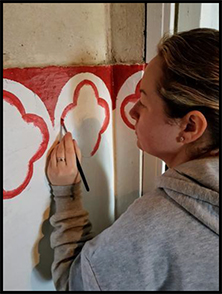
The first event we celebrated in the chapel was the rededication of England as the Dowry of Mary, a title connected to Walsingham. It was great! On Passion Sunday we had a little procession and waved Palm leaves from our Garden. On Maundy Thursday, my husband – the Father in our house, washed the feet of his children. On Good Friday we knelt at the altar rails we made out of an old children’s play pen, and venerated the cross.
Our candle light Easter Vigil was amazing, and has gone down in history as the “best Easter ever” by our 6 year old who got to not-so-solemnly drenched us with holy water as we renewed our baptismal promises. We made our own Easter candle, and had a small fire in a tin bucket outside to begin our service. We used what we had, and it was enough.

Many other families have had similar experiences this Easter within their domestic churches, and we all feel that we are beginning to discover, and reclaim our authority as primary educators of our children. This is the third great blessing that has come out of this unprecedented time, and perhaps the most important one for the future of the church.
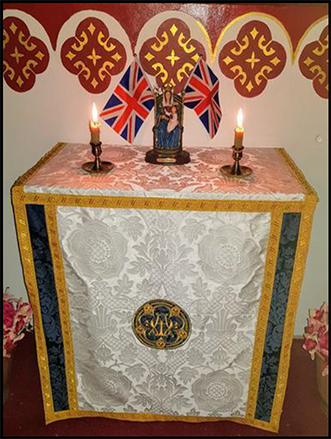
For several generations now, the role of primary educator has been outsourced to schools, and catechists. This has been done with the best of intention, and the teachers and catechists have put their heart and soul into teaching the children in their care about the Catholic faith. But if the child then goes back into a home in which the faith is not practiced other than on Sunday morning, it becomes a compartmentalised thing that is easily rejected later on. This, sadly, has become the norm.
Outsourcing the role of primary educator, robs and absolves the parents of their responsibility and authority. They become passive. Transmitting the faith becomes someone else’s job, and varies in theological accuracy depending on which parish or school you belong to.
The sad, and irrefutable truth is that this approach hasn’t worked. Baptism has now become a rite of passage to get into the local Catholic school, and First Communion is a party with a pretty dress. Many children don’t make it to confirmation because the family has stopped going to Mass by that point. As a church, we need to think again. Children are most effectively evangelised through their parents lived example of the faith, in the ordinary moments of day to day family life. St Teresa of Avila teaches us that ‘God is found in the pots and pans‘.
Lockdown is proving to be a time of great growth for families. Parents have had their normal faith routines disrupted, and now find themselves entirely responsible for the formation of their children. Passivity is no longer an option. For us, it has come as a welcomed wake up call. Of course, we can never replace the role of the Priest, or of the parish. Our hope is that going forward, the church will alert parents to their role as primary educators, and support them in carrying it out – rather than trying to do it for them.
In 50 years time, I want my children to hold treasured memories of how our family prayed together at home during their childhood. And I hope that the solid foundation and lived example of the faith will be lovingly transmitted through their domestic church to their children, and grandchildren, and great grandchildren.
Written by Clare Short of Ryde